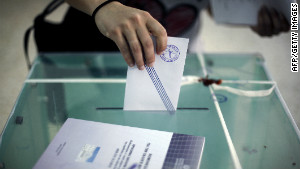
- The Leftist party is under pressure to form a government or give up Thursday
- Socialist PASOK leader says, "At this stage there is no solution"
- If no government is formed by May 17, Greece has to call new elections
Athens, Greece (CNN) -- Greece's far-left party Syriza must succeed in forming a government Thursday or admit failure, but party leader Alexis Tsipras faces an uphill task.
He is the second Greek politician to try to build a coalition after Sunday's elections in which voters angry about tough government budget cuts fled to parties on the far left and right to punish more moderate parties that made the cuts.
Wednesday found Greek politicians unable to come up with a government, while in the wings Tsipras met with Evangelos Venizelos of the socialist PASOK party and Antonis Samaras of center-right New Democracy after laying out a radical agenda he hopes to pursue, if he becomes prime minister.
"At this stage there is no solution," PASOK's Venizelos said. "But we must keep trying."
If no one can pull together a coalition, and no national unity government can be formed by May 17, Greece must call new elections.
Tsipras is the second Greek politician to try to form a government after Sunday's elections. His left-wing Syriza party came in second in the elections as seven parties won seats in parliament but no party captured more than 19% of the vote. Syriza more than tripled its parliamentary representation to 51 seats out of 300 in the balloting.
The New Democracy party placed first, but party leader Samaras gave up efforts to form a government Monday, the same day he received the mandate from President Karolos Papoulias to try to lead the country.
 Can anyone govern Greece?
Can anyone govern Greece? If Syriza fails by Thursday, then it will be PASOK's chance to form a coalition government.
 What's next for Greek voters?
What's next for Greek voters? Venizelos has said that PASOK first will support a national unity government formed by pro-European parties.
 Elections leave Greece in 'paralysis'
Elections leave Greece in 'paralysis' If that doesn't happen, Venizelos said that PASOK would be willing to support a coalition formed of other parties as long as it would ensure Greece remains in the eurozone.
 Europe's elections: Lesson for the U.S.?
Europe's elections: Lesson for the U.S.? Tsipras has called for the cancellation of the severe budget-cutting measures forced on the country by international lenders. Laws that cut pensions and salaries and those that "cancel basic workers' rights" must be annulled, Tsipras said.
He also called for state control of the banks, which "remain in the hands of the managers who bankrupted the system," he said. The Greek people voted clearly to reject the austerity demanded by international lenders, Tsipras said.
Tsipras called on Venizelos of PASOK and Samaras of New Democracy to renounce publicly the deal they made with international lenders. Tsiprias said they "don't have a majority any more to vote for the plundering of the Greek people."
 The future of austerity in Europe
The future of austerity in Europe Samaras said the Syriza leader was doing everything possible to ensure no government would be formed. He said that Tsipras' proposals would result in Greece exiting the eurozone, the group of 17 countries that use the common European currency.
The election results were widely seen as a message to politicians to back away from the harsh economic austerity measures imposed in Greece.
A European Commission spokeswoman said this week that Greece needs time to work through its political process but reminded the country's leaders that they would be expected to abide by terms of a bailout program meant to avoid a crippling financial meltdown.
"The commission hopes and expects that the future government of Greece will respect the engagements that Greece has entered into," spokeswoman Pia Ahrenkilde Hansen told reporters.
New Democracy finished first in Sunday's voting but ended up with only 108 seats in Greece's 300-seat parliament.
Voters also delivered a rebuke to PASOK -- New Democracy's socialist partner in the outgoing coalition government -- stripping the party of 119 seats.
Together, the parties fell short of the 50% necessary to continue the coalition, requiring formation of a new government.
Last year, Greece's debt threatened to force it to drop Europe's common currency, the euro, prompting the European Central Bank and other lenders to swoop in with emergency funding. In exchange, they demanded that the government slash spending.
The resulting measures have led to tax increases and cuts in jobs, wages, pensions and benefits -- and significant public outcry.
The national unemployment rate for January, the latest month for which figures are available, was nearly 22%, prompting widespread protests and leading some young people to leave the country in search of work.
Youth unemployment is even higher than the national average of one in five out of work.
For two years, the country's massive amount of debt has threatened the stability of the eurozone.
Greece pushed through a huge debt swap in March to save it from disorderly default and clear the way for it to receive a second bailout from the European Union, the European Central Bank and the International Monetary Fund, worth €130 billion ($171.5 billion).
The debt restructuring deal gave some breathing space to the eurozone bloc, where fears that Greece might collapse had increased pressure on other debt-laden nations such as Spain and Italy.
CNN's Antonia Mortensen and Matthew Chance and journalist Elinda Labropoulou contributed to this report.



